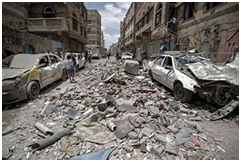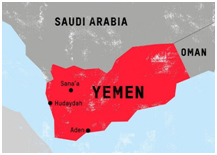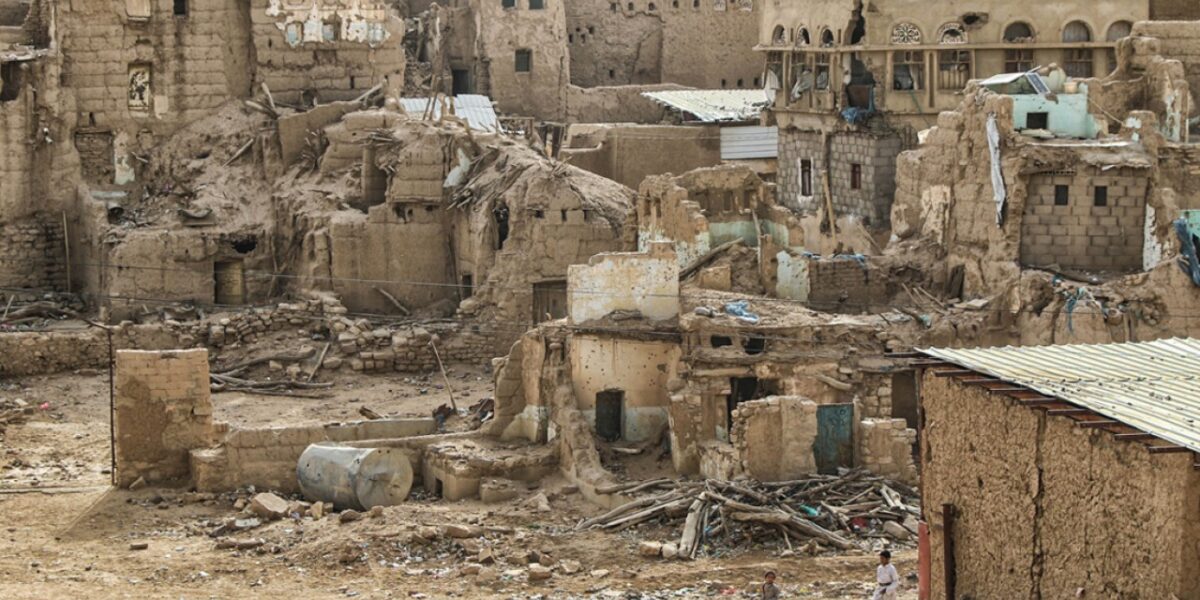Amana Hussain questions the Ummah’s collective neglect of the people of Yemen.
“O you who believe! Stand out firmly for justice, as witnesses to Allah, even against yourselves, or your parents, or your kin, and whether it be (against) rich or poor: for Allah can best protect both. Follow not the lusts (of your hearts), lest you swerve, and if you distort justice or decline to do justice, verily Allah is well-acquainted with all that you do.” – The Holy Qur’an (4:135)
 As the world centres their attention on the Qatar World Cup and human rights issues there, Yemen enters its 8th year of war. Human Rights Watch has recorded 90+ illegal Saudi-led coalition airstrikes on Yemen, while the Yemen Data Project reports an even more devastating figure of 20,100 airstrikes2. Yet where is the support for our Ummah in Yemen?
As the world centres their attention on the Qatar World Cup and human rights issues there, Yemen enters its 8th year of war. Human Rights Watch has recorded 90+ illegal Saudi-led coalition airstrikes on Yemen, while the Yemen Data Project reports an even more devastating figure of 20,100 airstrikes2. Yet where is the support for our Ummah in Yemen?
After the Arab Spring toppled dictators across the Middle East, Yemenis wanted change too. However, the governmental transition in November 2011 from President Ali Abdullah Saleh to Hadi failed. There was mass unemployment, food insecurity, violence, and a separatist movement in the South of Yemen resulting in war.
On the one hand are the Houthis, a Shia rebel group loyal to former President Saleh. On the other are forces loyal to the new Hadi government. Considering the Houthi actions an opportunity for Iran to gain a foothold on Saudi Arabia’s borders, the Kingdom which supports the Hadi government began a devastating military campaign. Leading Yemen to become a violent playground for regional and international powers.
 The humanitarian crisis has been further worsened by the restrictions that the Saudi-led coalition has imposed on Houthi controlled territories, stopping the inflow of UN rations1, and diverting fuel tankers. Fuel is crucial for powering generators in hospitals and pumping water to homes. Information about the Yemen crisis has also been restricted since the Saudi led coalition forces imposed restrictions on UN flights to Houthi controlled areas from May 2017. Because of this, Sanaa International Airport was also closed from August 2016 until recently. The violence, blockade, and censoring has prevented the voice of the people of Yemen from reaching the rest of the world.
The humanitarian crisis has been further worsened by the restrictions that the Saudi-led coalition has imposed on Houthi controlled territories, stopping the inflow of UN rations1, and diverting fuel tankers. Fuel is crucial for powering generators in hospitals and pumping water to homes. Information about the Yemen crisis has also been restricted since the Saudi led coalition forces imposed restrictions on UN flights to Houthi controlled areas from May 2017. Because of this, Sanaa International Airport was also closed from August 2016 until recently. The violence, blockade, and censoring has prevented the voice of the people of Yemen from reaching the rest of the world.
Saudi Arabia is not solely responsible for the suffering in Yemen. Their coalition partner, the United Arab Emirates has been conducting airstrikes on Yemeni soil. They are both struggling for control over Yemen’s south where the UAE is in support of a separatist movement that is fighting for independent control over Southern Yemen. Instead of using their economic power to aid and fulfil the Yemeni people’s needs, Saudi Arabia and UAE are fighting over the spoils of war.
On top of this, authorities in Bangladesh and Afghanistan expressed support for Saudi Arabia’s involvement in Yemen – the country which has reportedly undergone over 20,000 airstrikes on Yemeni land. Have they disregarded our innocent Yemeni brothers and sisters living out the suffering inflicted by this mindless war?
Pakistan is another country that has neglected the people of Yemen. It hasn’t expressed support for any parties involved in the war but has maintained a passively neutral stance on the Yemen crisis. The whole Muslim community has disturbingly remained quiet in the wake of the atrocities committed in Yemen. The years long war continues with no peaceful end in sight, if things remain the same. Rather than seeking to de-escalate or resolve the conflict, through encouraging dialogue and a ceasefire, Muslim-majority countries authorities are trying to maintain a foothold of economic power in Yemen or are remaining silent.
Abdullah Antepli, Islamic Studies professor at Duke University9 said “These people are not destroying and killing each other because of their sectarian identities. They are killing each other because of a power struggle and geopolitical issues in the region.” This confirms that some of the ruling class in Muslim majority countries often advance political and hegemonic agendas in the name of religion or protecting their sects, when in reality it is to gain economic power.
As Muslims we must speak out against all forms of oppression, not least when it is Muslims being killed and it is Muslim heritage sites that are being destroyed. We – the ummah including both individuals and those in privileged positions of power should not, and simply cannot ignore the crimes being committed against the people of Yemen.
Ending on a more hopeful note, there have been cases of countries who have shown concern for the people of Yemen. The Kuwaiti Former Prime Minister Sheikh Sabah al-Khalid Al-Sabah proposed peace talks in Yemen to end the war, saying that the only possible course of action left to resolve the Yemen crisis is open dialogue. Meanwhile, Oman authorities expressed the desire to help host peace talks between Saudi Arabia and the Houthi Rebel Group. If every Muslim country’ authorities take active steps to help the Yemeni community and support them to fulfil their needs, the condition of Yemen would improve bi’ithnillah.
The above Qur’an verse from surah an-Nisa’ reminds us that as Muslims, it is our duty to act justly, and not get distracted or discouraged by worldly affairs, which take us away from the path of worshipping Allah how He (SWT) has decreed. We must ask ourselves- individuals at all levels of power, whether that be university students or government officials – Have worldly gains distracted us so much that we don’t even see or acknowledge the atrocities occurring in Yemen in part due to Muslim countries?
Will we be the change and support for our Ummah in Yemen which has been absent thus far?
Please don’t forget our ummah in Yemen in your duas.
Amana Hussain is part of the Ayaan Institute’s Research Associate Programme. The programme provides training and mentoring in many areas for Associates and offers them the chance to write an article for publication through conducting their own research.
- Why is the Muslim world silent about Yemen? – The Muslim Vibe
- World Report 2020: Yemen | Human Rights Watch (hrw.org)
- War-torn Yemen on brink of famine – Islam21c 4) Yemen in Crisis (ethz.ch)
- Yemen: The world’s largest humanitarian crisis (unfpa.org) 6) Why are 10 countries attacking Yemen? (brookings.edu)
- Yemen′s war explained in 4 key points | Middle East | News and analysis of events in the Arab world | DW | 10.08.2018
- Report points to Iran sending arms to rebels in Yemen | News | DW | 30.11.2016
- Yemen Crisis Bares Rifts Among Muslim-majority Countries (voanews.com)
- Crisis in Yemen: Unrelenting conflict and risk of famine | International Rescue Committee (IRC)
- Map of Yemen Crisis – Bing images 12) yemen war – Bing images



Leave a Reply